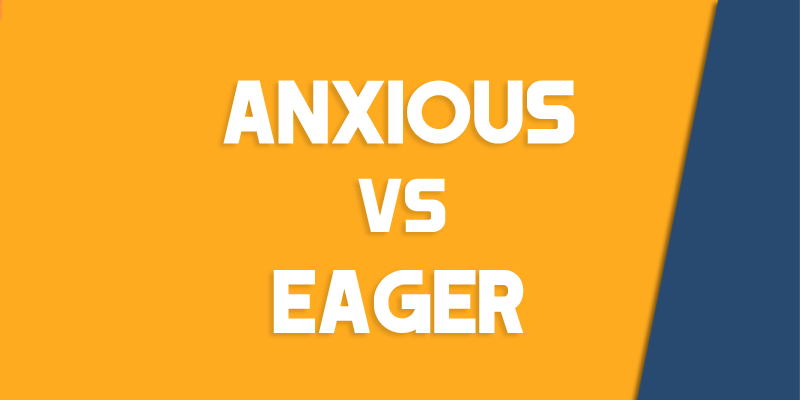Anxious versus Eager – What’s the Gist?
Anxious and eager are two completely different words, but they are often confused because their definitions are similar. It is the connotation of each word that dictates whether anxious or eager should be used.
- Anxious is an adjective that typically describes an uneasy feeling one has.
- Eager describes a feeling of excitement rather than unease.

How to Use Anxious in a Sentence
Anxious definition. Anxious refers to an uneasy feeling or worry one has about an upcoming event, such as one might feel before a major test.
For example,
- Jeffery was anxious about his upcoming appearance in traffic court.
- Bella became anxious about an hour before she went to take her driving test.
The word anxious generally carries a negative connotation (the feeling associated with a word). This is likely because one’s being anxious is associated with worry or nervousness, a feeling few people enjoy. Therefore, when one uses anxious, it is usually associated with some task the speaker does not want to complete.
How to Use Eager in a Sentence
Eager definition. Eager is also an adjective. To be eager is to be “full of keen desire.”
Eager usually carries a positive connotation. Many brides eagerly await their wedding day. Students may be eager for Christmas day or summer break.
- Small children go to bed on Christmas Eve eager to wake up early and see if Santa has arrived.
- Teachers are often as eager as their students for summer vacation.
When comparing anxious vs. eager, there is a distinct difference in how the speaker feels about the upcoming event. One is a feeling or worry (anxiousness), and one is a feeling of excitement (eagerness).
Outside Examples of Anxious and Eager
- “Holiday Eating Got You Anxious?” New York Times
- Britain feels anxious with traditional loyalties cracking. Chicago Sun Times
- “He’s eager to get back, and he’s eager to prove himself, and I believe, as a player, that’s the right mentality that you should have,” Beltran said. Chicago Tribune
- The heftiest $6,500 price tag was found at Soho Trees, which has seven stands located throughout Manhattan to service city dwellers eager to decorate their apartments with a real evergreen. New York Times
Phrases that Use Anxious and Eager
While there are very few phrases that use the word anxious as it is written, there are numerous idioms that express feelings of anxiety. For example, people may say they “broke out in a cold sweat” due to anxiety, or they are “as nervous as a cat on hot bricks.” Both expressions mean that a person is dreading an upcoming event.
Perhaps the most common expression you’ve heard using the word eager is the term “eager beaver.” This phrase refers to someone who is so enthusiastic about something that he or she is borderline annoying. You may also hear someone say they will be at an appointed place “with bells on.” This also means they enthusiastically look forward to an event or the person is full of nervous (excited) energy.
How to Remember These Words
Anxious and eager are two words that are often misused due to a lack of understanding of the connotation of each word.
A person is usually anxious about an event that they dread attending while someone is eager to see other occurrences take place.
For instance, the teacher might be eager for the first day of school, but students are often anxious. Using this sentence, remember the teacher is eager – and those words share similar vowel sounds. Students are often anxious – dreading – the first day of school, usually because they must deal with the unknown. Remember the unknown makes us anxious at times.
Article Summary
Is anxious or eager correct? If you are discussing an event you aren’t quite looking forward to, such as a dental appointment, use anxious to describe the apprehension you feel. When discussing an event you might be excited about, use the word eager.
- Anxious describes a feeling of dread; it is associated with a negative type of nervousness.
- Eager describes a feeling of excitement and is associated with a positive type of nervousness.
